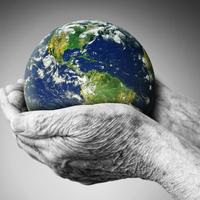Earlier this year I wrote about the movement that has built up calling on the United Nations to pass a Convention on the rights of older people. In this 70th anniversary year of the Universal Declaration of Human Rights (UDHR), the specific rights and entitlements of older people still remain unprotected by a UN convention. To respond not only to pressure from civil society, but also increasingly from particular UN member states, in 2010 the UN established an Open-ended Working Group on Ageing (OEWG), with the task of strengthening the protection of older people's rights by reviewing existing rights instruments, identifying gaps, and exploring the feasibility of new laws.
The OEWG met for its ninth session in New York this summer. While the UN process is important, so too is the context in which these sometimes technical debates take place. While the impact that pressure from civil society has on political decisions and policymaking is difficult to evaluate, there is little doubt that the expression of solidarity inherent in coming together around a campaign theme is as important to older people as it is to any other age group. It is therefore important to find spaces in which advocacy by older campaigners themselves can take place. Each year one such space is the UN International Day of Older Persons on 1st October. This year the UN has offered such an opportunity through making the theme of the 2018 Day of Older Persons celebrating older human rights champions.
As the UN points out, many of the older human rights campaigners today were born about the time of the adoption of the UDHR in 1948. They are as diverse as the societies in which they live and range from high profile figures such as the Elders group, to the many older people advocating for human rights at the grass roots and community level. For IDOP2018 this week, HelpAge International has published a selection of inspiring ‘untold stories’ of older campaigners all over the world, many in humanitarian crises and other challenging circumstances.
Yet even as the participation of older people in campaigns is increasingly recognised, they still have to contend with stereotypical evaluations of their role. In a recent blog, for example, Duncan Green of Oxfam compares the advantages of working with younger and older campaigners. For Green the former “move fast, are connected and creative, so you can get rapid change...and loads of new ideas”. Older people on the other hand are apparently “better connected, have more knowledge of power and how advocacy targets like companies or the state work; they may stay with the campaign longer than young people whose lives are going through rapid change”.
Such views notwithstanding, older activists can be found in all phases of campaigning, and grass-roots campaigns are a means of enabling participation from a wide cross-section of older people. Such community activism may be triggered by a specific event, such as the widespread floods in northern Pakistan during 2010. Here the response of humanitarian agencies included the establishment of local level older people’s associations, which coalesced in a campaign for legislation to protect older people’s entitlements in health and social security. Public advocacy and lobbying of politicians and officials contributed to the passage of a senior citizens’ act in the province of Khyber Pakhtunkhwa in 2014. Progress towards implementation of the legislation has however been slow, perhaps an indication of the limitations as well as the strengths of older citizen campaigning. More on this below.
The involvement of older activists in campaigns for change extends beyond concern for their own rights. This is acknowledged by the UN, which has as one of the objectives of this year’s International Day of Older Persons, to “raise the visibility of older people as participating members of society committed to improving the enjoyment of human rights in many areas of life and not just those that affect them immediately”. As the UN notes, many older people have a lifetime of engagement behind them. Many of those now in later life were born around the time of the UDHR, and participated in their countries’ independence movements and struggles for political rights throughout the second half of the twentieth century. In a 2017 article in the American Society on Aging journal ‘Aging Today’, E.P. Stanford and E.E. Rivas list some of the prominent American activists whose engagement continued throughout their lives, and note that “Older adults’ fingerprints are all over the history of the Civil Rights Movement”.
For those older campaigners in Pakistan as much as for the Gray Panthers in the US, the question remains. Why do some campaigns influence the political agendas and bring about real change, while others do not? Clearly evidence matters, but that is to ignore the importance of other factors (such as political power relations) in influencing change. An interesting set of recent articles analyses pairs of issues in global health to tease out reasons for the effectiveness or otherwise of particular campaigns.
Three points emerge, which make instructive reading for campaigners around issues of ageing. Firstly, networks matter; they provide a means to sustain collective action over time, which single campaigns cannot. But networks need to do more; they need to build a consensus around a shared analysis of the problem and a pathway to change, building in the process a broad partnership of support which goes beyond their own supporter constituency. Lastly, and perhaps less satisfactorily, the answer to the question as to whether successful campaigns shape the policy agenda, or opportunistically utilise positive and conducive policy environments, is that they do both.
Perhaps then for older campaigners it is a matter of identifying the issues that are susceptible to change, and the pathways to achieve it; the campaign for a UN convention for older people may just provide that vehicle. There are lessons to be learned from other campaigns, and from the organisational networks which sustained them. In the early years of this century, for example, disability campaigners made a compelling case for a convention protecting the rights of people with disabilities. Campaigning groups came together in a broad coalition, the International Disability Alliance, which from 1999 both drove their agenda and took advantage of an increasingly receptive policy environment. So too may older people hope that by building a strong network for change they also will achieve recognition of their rights.
About the Author
Mark Gorman is a Visiting Fellow at OIPA. He is Senior Policy Advisor at HelpAge International. For more information on social pensions around the world visit HelpAge’s Pension watch website.
Comments Welcome
We welcome your comments on this or any of the Institute's blog posts. Please feel free to email comments to be posted on your behalf to administrator@ageing.ox.ac.uk or use the Disqus facility linked below.
Opinions of the blogger is their own and not endorsed by the Institute
Comments Welcome: We welcome your comments on this or any of the Institute's blog posts. Please feel free to email comments to be posted on your behalf to administrator@ageing.ox.ac.uk or use the Disqus facility linked below.













